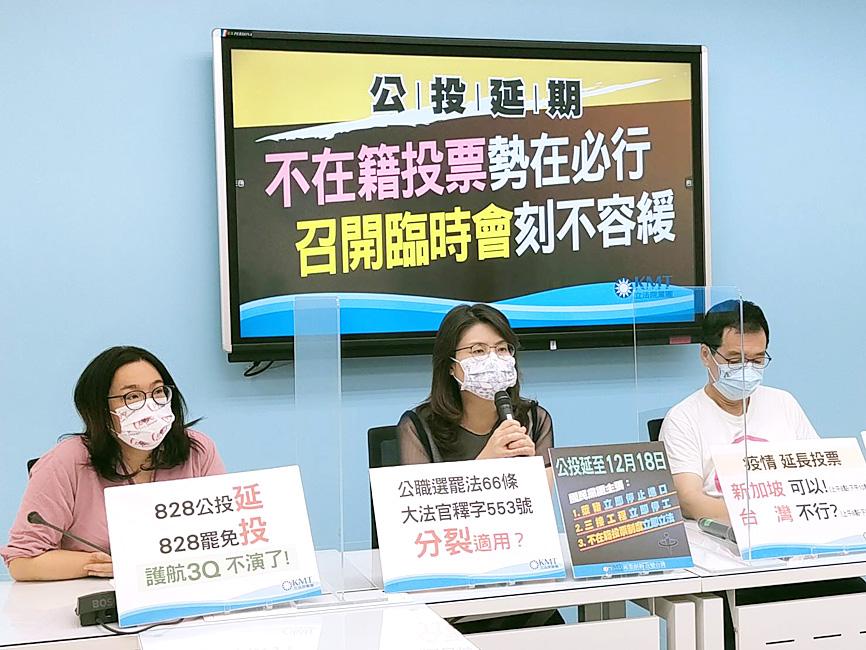Chinese Nationalist Party (KMT) caucus officials yesterday demanded that the head of the Central Election Commission (CEC) explain its decision to delay a referendum that had been scheduled for next month, but not the recall of a legislator.
The officials said they would next week go to CEC Chairman Lee Chin-yung’s (李進勇) office to have him explain why the commission on Friday postponed an Aug. 28 referendum to Dec. 18, citing COVID-19 concerns, but tentatively scheduled the recall election of Taiwan Statebuilding Party Legislator Chen Po-wei (陳柏惟) for Aug. 28.
The commission said that it would convene on July 16 to discuss whether to reschedule the recall.

Photo courtesy of the KMT legislative caucus
KMT caucus secretary-general Cheng Li-wun (鄭麗文) in an online news conference said she was puzzled as to why the commission had unanimously voted to delay the upcoming referendum on four proposals, while leaving the Chen recall for deliberation.
KMT caucus deputy secretary-general Jessica Chen (陳玉珍) said that the caucus supports delaying the referendum, but questions the legal basis for the move.
The amended Referendum Act (公民投票法), which separates referendums from general elections, does not provide a legal basis for delaying referendums, the KMT caucus said, calling for an extraordinary session to amend the act to allow for postponements.
The allowance for absentee voting, which the KMT has argued for, also remains unresolved, Jessica Chen added.
Taiwan does not have an absentee voting system, meaning voters must cast their ballots in person in the areas where their households are registered.
These “kinks” need to be ironed out during an extraordinary session, and there is no reason why the Democratic Progressive Party (DPP) should be afraid of convening such a session, she said.
Cheng also urged the DPP to end what she said was an abuse of its legislative majority and allow the legislature to enact laws for the betterment of Taiwanese, instead of being a rubber stamp for certain political parties.
Additional reporting by CNA

The Sports Administration yesterday demanded an apology from the national table tennis association for barring 17-year-old Yeh Yi-tian (葉伊恬) from competing in the upcoming World Table Tennis (WTT) United States Smash tournament in Las Vegas this July. The sports agency said in a statement that the Chinese Taipei Table Tennis Association (CTTTA) must explain to the public why it withdrew Yeh from the WTT tournament in Las Vegas. The sports agency said it contacted the association to express its disapproval of the decision-making process after receiving a complaint from Yeh’s coach, Chuang

The Hualien Branch of the High Court today sentenced the main suspect in the 2021 fatal derailment of the Taroko Express to 12 years and six months in jail in the second trial of the suspect for his role in Taiwan’s deadliest train crash. Lee Yi-hsiang (李義祥), the driver of a crane truck that fell onto the tracks and which the the Taiwan Railways Administration's (TRA) train crashed into in an accident that killed 49 people and injured 200, was sentenced to seven years and 10 months in the first trial by the Hualien District Court in 2022. Hoa Van Hao, a

Control Yuan Secretary-General Lee Chun-yi (李俊俋) tendered his resignation last night, admitting that he had misused a government vehicle, as reported by media. His resignation was immediately accepted by the Control Yuan. In a statement explaining why he had resigned, Lee apologized for using a Control Yuan vehicle to transport his dog to a pet grooming salon on May 20. The issue first came to light late last month, when TVBS News reported that Lee had instructed his driver to take the dog to the salon. The news channel broadcast photos that it said were taken by an unnamed whistle-blower, which purportedly showed the

Taipei has once again made it to the top 100 in Oxford Economics’ Global Cities Index 2025 report, moving up five places from last year to 60. The annual index, which was published last month, evaluated 1,000 of the most populated metropolises based on five indices — economics, human capital, quality of life, environment and governance. New York maintained its top spot this year, placing first in the economics index thanks to the strength of its vibrant financial industry and economic stability. Taipei ranked 263rd in economics, 44th in human capital, 15th in quality of life, 284th for environment and 75th in governance,